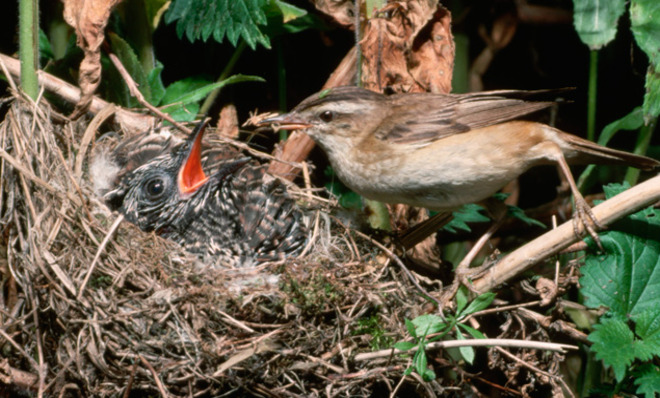Cheaters do prosper. Just ask a cuckoo.
The cuckoo thrives by cutting corners

A free daily email with the biggest news stories of the day – and the best features from TheWeek.com
You are now subscribed
Your newsletter sign-up was successful
The common cuckoo is a parasite, as are many of its cousins in the family Cuculidae. "Parasite" is a word that usually conjures images of some insect worming its way into your body and exploiting it from within, but you can rest easy knowing that a 13-inch-long bird isn't going to try to take up residence in your intestines. These guys are brood parasites: They lay their eggs in the nests of other bird species, and outsource the care and raising of their chicks to unwitting foster parents.
They're really good at what they do, too. The adults, chicks, and eggs often all bear a close resemblance to their counterparts in the host species. They can even mimic the songs and calls of their hosts. This all helps to keep the new parents from catching on to the ruse. And when the cuckoo chicks hatch, they frequently push their foster siblings out of the nest to secure more food for themselves.
All this trickery isn't going to win the cuckoos any parenting awards, but it might help them thrive where other birds fail. Almost a decade ago, scientists noted that some of the cuckoos that actually raise their own young were critically close to extinction, while none of the parasitic species were listed as endangered. Simon Ducatez, a biologist at McGill University in Canada, wondered if the cheaters were still prospering.
The Week
Escape your echo chamber. Get the facts behind the news, plus analysis from multiple perspectives.

Sign up for The Week's Free Newsletters
From our morning news briefing to a weekly Good News Newsletter, get the best of The Week delivered directly to your inbox.
From our morning news briefing to a weekly Good News Newsletter, get the best of The Week delivered directly to your inbox.
To find out, Ducatez gathered data on hundreds of species of cuckoos, and looked for connections between their breeding system (either brood parasitic or not) and their extinction risk (as measured by their IUCN Red List status). Even when he controlled for variables like size, migration behavior, and habitat type, he found that the parasitic cuckoos had a much lower risk for extinction and more stable populations than the species that did their own parenting. He also found that the cuckoos that exploit many different species are faring better than ones that specialize in being a parasite for just one host species.
For cuckoos, it looks like putting all your eggs in one basket isn't the smart way to go. But why? Ducatez thinks that by refraining to invest too much in their kids, as well as spreading the risks to their eggs around different nests, parasitic cuckoos insulate themselves from changes to their environment and habitat.
Say a cuckoo lays eggs in nests in two neighboring areas. If one is affected locally by logging or pollution and the nests there fail, the eggs outside that area can still hatch and thrive.
Plus, because different species use different resources and have different competitors and predators, changes in their habitat will affect them differently. Some birds, for example, feed their chicks insects, while others prefer seeds. If caterpillars are scarce one year, it can have devastating effects on the birds that eat them. But the seed-eating birds shouldn't be affected, and their nests and the cuckoo eggs in them can get through the caterpillar drought just fine.
A free daily email with the biggest news stories of the day – and the best features from TheWeek.com
"By laying eggs in the nests of several species, brood parasites spread nest failure due to specific threats," says Ducatez. "In an altered habitat, if at least some of the host species targeted by a brood parasite are able to resist the changes, it should be beneficial for the parasite, too."
A strategy of hedging your bets could also signal a broader ecological flexibility. If cuckoo chicks can grow in varied environments on different diets, and match their behavior and even their songs to their host family for the sake of blending in, it would seem that they're well suited to weathering changes in habitat and resources — a gift that could help keep them off the Red List.
Ducatez says that testing these ideas will require more data on brood parasite ecology, habitat, and host use. Before scientists can dig deeper into the advantages of being a deadbeat parent, they'll have to go a little more cuckoo for cuckoos.
-
 What to expect financially before getting a pet
What to expect financially before getting a petthe explainer Prepare for your furry friend and your wallet
-
 Pentagon spokesperson forced out as DHS’s resigns
Pentagon spokesperson forced out as DHS’s resignsSpeed Read Senior military adviser Col. David Butler was fired by Pete Hegseth and Homeland Security spokesperson Tricia McLaughlin is resigning
-
 Colbert, CBS spar over FCC and Talarico interview
Colbert, CBS spar over FCC and Talarico interviewSpeed Read The late night host said CBS pulled his interview with Democratic Texas state representative James Talarico over new FCC rules about political interviews